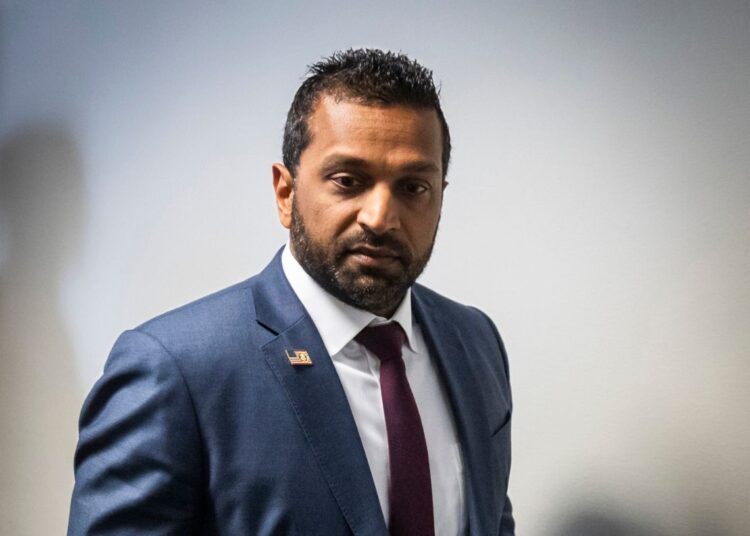Perhaps the construct most validated by Trumpism is the so-called “deep state,” recycled into the political idiolect by Mike Lofgren in 2014. In his essay “Anatomy of the Deep State,” he defines it as “a hybrid association of elements of government and parts of top-level finance and industry that is effectively able to govern the United States without reference to the consent of the governed as expressed through the formal political process.”
The deep state, he said then, is not “a secret, conspiratorial cabal; the state within a state is hiding mostly in plain sight, and its operators mainly act in the light of day. Nor can this other government be accurately termed an ‘establishment.’ All complex societies have an establishment, a social network committed to its own enrichment and perpetuation.”
This veritable delirium, grotesquely inspired by President Dwight Eisenhower’s famous farewell speech in 1961 — the figurehead of the military-industrial complex — is what Trumpists use to brand their political enemies to remove them from the public scene and have a free hand to replace them with Donald Trump loyalists.
Kash Patel is one of the most conspicuous defenders of this concept. That is why Trump has proposed him as the new director of the FBI, breaking with a post-Watergate practice according to which its directors serve ten-year terms. This extended term aims to ensure that the FBI does not serve the political interests of a specific president.
Its current director, Christopher Wray, appointed by Trump himself after firing James Comey, is due to complete his term in 2027. Still, Trump has already been clear on the matter: he has just declared that Wray has “invaded my home,” a reference to the FBI searches carried out at Mar-a-Lago in search of criminal evidence for the documents he took from the White House.

In an interview this year with NBC, Patel said he would “close” the FBI headquarters in Washington, D.C., and “reopen it the next day as a deep state museum.” In fact, this character is one of Trump’s most visceral defenders, the same one who has called for eliminating government employees who are considered insufficiently loyal, in so many words, and has made a fairly extensive list of those who are excludable. It includes both Democrats and Republicans, the latter placed in the public pillory for opposing/distancing themselves from the top leader. It includes, among many others, the following officials:
- Michael Atkinson: former inspector general of the intelligence community.
- Lloyd Austin: Secretary of Defense.
- Brian Auten: FBI official who oversaw the agency’s investigation into Russian interference in the 2016 election.
- James Baker: former FBI general counsel and former deputy general counsel of Twitter.
- Bill Barr: Trump’s attorney general.
- John Bolton: Trump’s former national security advisor.
- Joe Biden: President of the United States.
- John Brennan: former CIA director who served under President Barack Obama.
- John Carlin: former acting deputy attorney general and former head of the Justice Department’s national security division.
- Pat Cipollone: former White House adviser under the Trump administration.
- James Clapper: former director of national intelligence under the Obama administration.
- Hillary Clinton: former secretary of state under the Obama administration and Democratic presidential nominee in 2016.
- James Comey: former FBI director fired by Trump in 2017.
- Mark Esper: Secretary of Defense under the Trump administration.
- Merrick Garland: U.S. Attorney General.
- Kamala Harris: Vice President of the United States and Democratic presidential nominee in 2024.
- Gina Haspel: former CIA director under the Trump administration.
- Fiona Hill: former National Security Council official under the Trump administration, specializing in Russia and Ukraine. Hill was one of the officials who testified in Trump’s first impeachment trial.
- Eric Holder: Attorney General during the Obama administration.
- Cassidy Hutchinson: former assistant to Trump’s former chief of staff.
- Mark Meadows: who testified before the Congressional select committee on January 6 on Trump’s actions related to the Capitol riots.
The other issue that Patel stands out for is classic of the Trumpist mentality and agenda, that is, the conception of the media as “enemies of the people.” That is why he has extended his whip to the so-called fourth power, one of the bases of U.S. democracy, and to its work as a watchdog against political power.
In an interview with Steve Bannon, another of the champions of Trumpism, Patel stated how he would treat journalists. “We’re going to come after the people in the media who helped Biden rig presidential elections. Whether it’s criminal or civil, we will deal with it.”
He went further, accusing “some people in the media” of coordinating actions with the government to spread “a false narrative” about Trump. “I have a problem with that,” Patel said. “And I think there should be some kind of accountability. I don’t know what that would like.”
Even though he later put up a fig leaf by saying that journalists were “invaluable,” his remarks are unlikely to turn off the red light of those who rightly see him as another embodiment of Trump’s promise to seek revenge against his enemies once established in the White House. His loyalty to Trump and his history of embracing conspiracy theories belies that. Patel is a classic product of the MAGA movement.
Angelo Carusone, president of Media Matters for America, expects the Trump administration to take a confrontational approach to the media. “It’s going to respond not only to what Trump is saying but also to what that broader underlying right-wing media ecosystem is asking and demanding,” he said. “We shouldn’t rule out the bloodlust that’s out there. These people want revenge.”
Now that this character is nominated to lead one of the most powerful government agencies, the question of whether or not he will actually “come after” journalists is a concern for both parties. It’s likely to become a central point of contention when he comes up for Senate confirmation, even with the current Republican majority. We’ll see.










